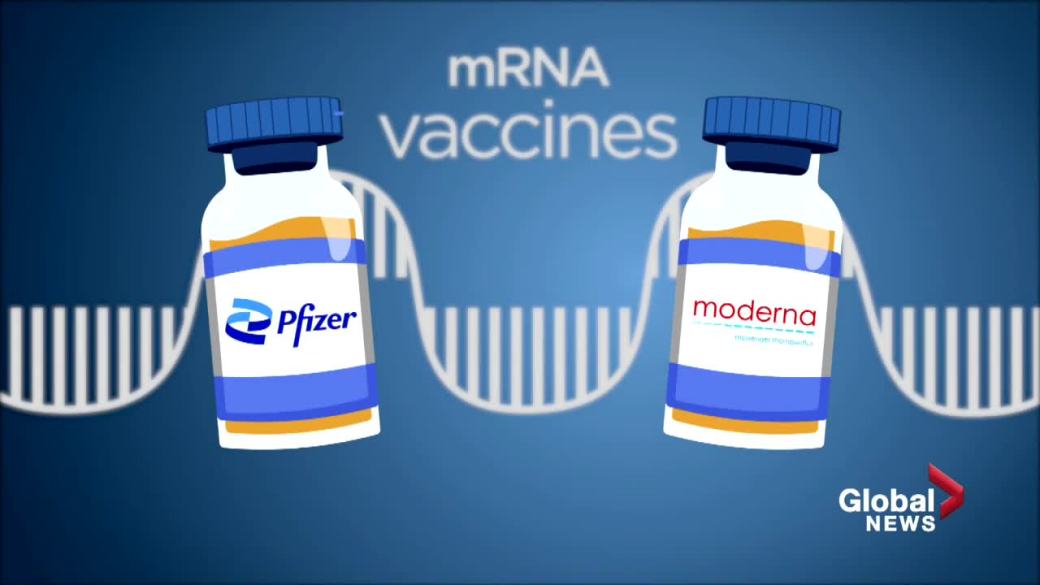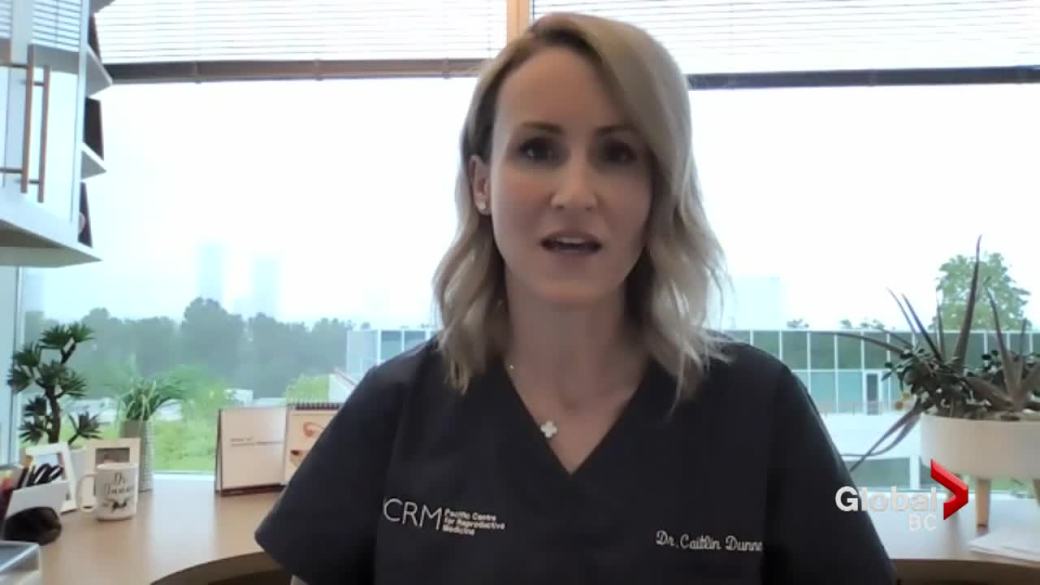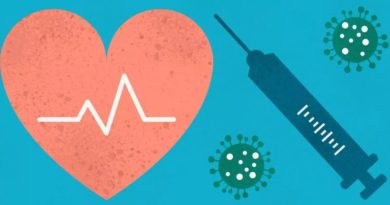COVID-19 conspiracy theories deter some from getting vaccine
There are many myths and conspiracy theories circulating about the COVID-19 vaccine.

Those false theories are sometimes responsible for people’s hesitancy in getting the shot.
Global News spoke to Dr. Don Sheppard, Chair of McGill University’s Microbiology and Immunology department and Director of the McGill Interdisciplinary Initiative in Infection and Immunity (MI4), to explore the myths surrounding the vaccine.
Myth #1: vaccines contain chips to track people
One common conspiracy theory is that COVID-19 vaccines insert microchips in your body to track you.
“Ask yourself why it hasn’t been used for thousands of other things that could make the owners of this ‘super cool’ nanotechnology gazillionaires? said Dr. Sheppard. “I mean, how big is that tracking Apple thing? If I injected that into your arm, you might notice.”
READ MORE: How Pfizer’s and Moderna’s mRNA-based COVID-19 vaccines work
Another false theory is that the vaccine contains enough metal to make magnets stick.
“For those of you who have looked at videos seeing magnets stuck on people’s arms, saying there must be something in there… Look a little deeper, and you’ll actually find the videos of people acknowledging that they lick the magnet before they stuck it on their arm,” said Dr. Sheppard.

Myth #2 steps were skipped with vaccines
Many were stunned to see how fast COVID-19 vaccines came out.
Traditionally, a vaccine could take up to a decade to develop.
So how was a COVID vaccine created and distributed in less than a year?
Research for coronaviruses and mRNA -the technology behind the Pfizer and Moderna vaccines has been going on for decades.
“I started 23 years ago working on RNA,” said Dr. Drew Weissman, professor of medicine at the University of Pennsylvania. Weissman is one of the pioneers of mRNA science.
“The reason why it was so fast, is with the RNA you only need a sequence, you don’t have to make the virus, you don’t have the protein, you just need the sequence. And we knew from 20 years of Coronavirus work that it was the spike protein that mattered.”
Dr. Weissman said that when the genetic sequence of COVID-19 was cracked on Jan. 12, 2020, they immediately got to work.
“We took the spike, and we made an RNA and we started immunizing animals. Moderna and BioNtech made it to immunize people,” said Dr. Weissman.
Dr. Weissman says there were no shortcuts in making the vaccine. His own wife was part of some of the first clinical trials for the Pfizer vaccine.
As for how fast they made it into people’s arms, Dr. Sheppard insists no red tape was cut.
“Having the regulatory agents reviewing the data 24/7 as it came in, instead of waiting for a beautiful little package with a bow and spending six months to go over it in meetings from 8-4 on alternating Fridays when everybody could get together in the room,” explained Dr. Sheppard.
“With the pandemic vaccines, it was all hands on deck. When there was data, it was reviewed.”
He says clinical trials were done as usual, with the same number of people, the same follow-up, the same safety signals and the same outcomes.
Myth #3: the vaccine causes infertility in women
Another theory that has circulated is that the COVID-19 vaccine could cause infertility in women.
Dr. Sheppard believes this myth might be a case of broken telephone.
“A scientist in Germany at the very beginning of the outbreak –talking about the virus, not the vaccine– noted that the spike protein might have some similarity to a protein in the placenta. And he was worried that antibodies after coronavirus infection can lead to infertility and loss of pregnancy. Now we know that’s not true,” Dr. Sheppard said.
Truth: vaccines come with side-effects and complications, but chances are low
Scientists don’t deny the vaccine could come with side effects and complications.
The Pfizer vaccine can cause allergic reactions like anaphylaxis. That’s one of the reasons patients are asked to wait 15 minutes before leaving the vaccination centre.
Other issues could come up days, even weeks after receiving the shot.
“A first dose of AstraZeneca probably 1 in 50,000 chances of a clot. The second dose, 1 in 500,000. We know that the chance of an allergic reaction to an mRNA vaccine is in the 1 in 1 million range. And right now, the numbers for the cardiac inflammation are so low that we have trouble measuring them,” explained Dr. Sheppard.
“But most people think they are probably going to be in the 1 in 1 million range.”
Truth: getting vaccinated will help end the pandemic
Dr. Sheppard says getting the shot is essential to ending the pandemic.
“We need to have high levels of vaccination in all people so that we can keep these infections at a reasonable level that we keep variant replication at a level that doesn’t spin out variants every second Tuesday, and that our population that’s at risk are protected and the best solution for this is for everybody who is eligible to get vaccinated,” Dr. Sheppard said.
Dr. Sheppard adds that young people should be getting the shot because they can still get infected and get “long COVID,” long-term effects of the disease.
“Reason number two is protecting those you love. Everybody in this world is connected to someone over the age of 60. And nobody wants to be the person responsible for transmitting the virus to someone who isn’t as easy to protect,” Dr. Sheppard said.

Lastly, Dr. Sheppard says that the way to avoid new variants appearing that are more aggressive and cause death, is to prevent the virus replicating.
“It’s not accident that we’ve seen these variants appear in countries where there are high levels of viral replication, transmission. If we clamp down on the number of cases, that gives the virus much less of a chance to evolve into a new variant,” the immunologist said.
“Someday that variant may not be so kind and gentle to 18-30 year-olds.”
Your best bet is to inform yourself with credible, scientific sources, experts argue, saying getting vaccinated can not only potentially save your life — it can save others.
© 2021 Global News, a division of Corus Entertainment Inc.




